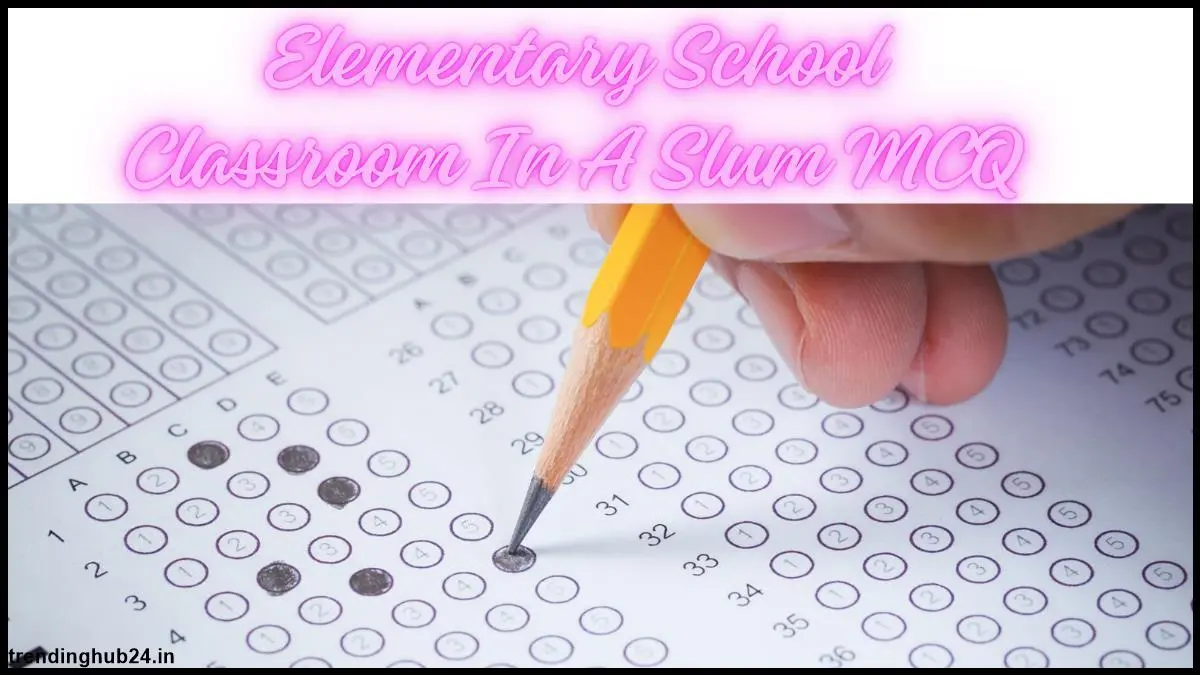🚀 Become a Verified Author on Trending Hub24
✍️ Author Account Available @ $60 / Month | +91 7355993756
Elementary School Classroom In A Slum MCQ

Exploring "elementary school classroom in a slum MCQ" leads to several reflections on what it means to get an education despite all the obstacles.
Table of Contents
Elementary School Classroom In Slum MCQ: Exploring Context And Tips To Crack MCQs
The poem "Elementary School Classroom in a Slum" exposes the inequalities in living conditions and educational opportunities that children in slums encounter. To highlight the sharp contrasts between the environment outside the slum school and the world inside, poet Stephen Spender used strong language and vivid imagery. If you are preparing for an elementary school classroom in a slum MCQ, you need to be aware of the context of each stanza. So, here is a post for you to let you learn the context of the poem and tips to learn MCQs
Learning The Context
An elementary school classroom in a slum becomes a miniature portrayal of the more significant social problems plaguing society. It's an environment that is very different from the idealized idea of what a supportive learning environment ought to be.
Exploring "elementary school classroom in a slum MCQ" leads to several reflections on what it means to get an education despite all the obstacles. In addition to drawing attention to education problems in underprivileged areas, this project aims to start discussions on closing the educational gap.
Stanza 1:
Spender opens with a description of the kids' physical attributes. When he calls them "rootless weeds," he suggests they are unwelcome and neglected. A tall female with a "weighed-down head" represents the weight of poverty.
Another kid is called a "paper-seeming boy," stressing his weakness due to malnutrition. As they watch a squirrel play outside, a toddler with "eyes like a rat" displays a gleam of hope and curiosity despite their dire surroundings.
Stanza 2:
It is said that the classroom walls are "sour cream," a sign of decay and neglect. A global map, the Tyrolese Valley, and donated posters of Shakespeare are used to decorate them. The children cannot access the world of beauty and wisdom displayed in these pictures. The poet clarifies that these kids' reality is not the picturesque images painted on the walls, but rather the slum beyond the window.
Stanza 3:
Spender criticizes educational materials as "wicked" and "a bad example." According to him, these pictures entice the kids with unattainable ambitions, which may make them commit crimes out of desperation. According to the poet, these resources make fun of the kids' awful realities rather than inspiring them.
Stanza 4:
In the last stanza, Spender asks the authorities, such as visitors, governors, and inspectors, to remove the obstacles preventing these kids from moving freely. He encourages them to embrace the knowledge that can lead to a better future, to let the kids "run naked into books," and to give them chances to encounter the real world.
How To Prepare For MCQs:
Before you get to start learning elementary school classroom in a slum MCQ, here’s what you should understand:
Read the Poem with a Focus
The poem should be read two or three times to begin. You can better grasp the main idea from the first reading. Pay attention to elements in the upcoming readings, such as the mood (hopeless) and tone (sad, serious). Observe how the poet depicts the slum life of the children.
What is the poet attempting to express? What feelings is he expressing? Make sure you ask yourself these questions to make learning easier for you.
Understand the Main Theme
Inequality in society and poverty are the poem's main themes. The poet Stephen Spender portrays the unfavourable and harmful living conditions of kids attending slum schools. He says that education ought actually to transform their life.
They have a better future if provided with appropriate learning chances. MCQs often ask about the theme. Thus, it's crucial to comprehend this.
Learn Key Images and Meanings
To convey the children's hardships, the poet uses strong images. A few key phrases to keep in mind are:
"Sour cream walls" refers to the dull and unclean walls.
"Twisted Bones" depicts children who are weak and unwell.
"Lead sky" refers to a gloomy, oppressive atmosphere.
"Their future is painted with a fog" illustrates how unpredictable their lives are.
Knowing them will enable you to respond to MCQs that use images.
Remember Important Lines
A few of the poem's lines make the poet's point quite evident. Here is an example:
"And yet, for these children, these windows, not this map, are their world.”
According to this sentence, the kids are unaware of the outside world portrayed in books or maps and only know what they can see outside the window, which is tragic life all around them. Try to recall and comprehend the meaning of these sentences because you can expect them in tests.
Learn About the Poet and Practice
Stephen Spender was a poet who supported equality and had compassion for the underprivileged. He might be asked about his life and the subjects he wrote about in MCQs. Use your book and other resources to complete the example multiple-choice questions at the end.
Examine key passages, meanings, and literary devices such as imagery, similes, and metaphors. Regular practice with an elementary school classroom in a slum MCQ with answers will lead to your desired result.
The Final Words
Before you take any exam, a deep understanding of the subject and constant practice will do the magic for you. You can confidently respond to multiple-choice questions (MCQs) if you attentively read the poem, acquire its essential phrases and ideas, and practice frequently. Your performance will improve if your mind is clear and concentrated.

